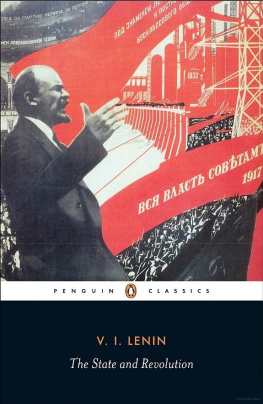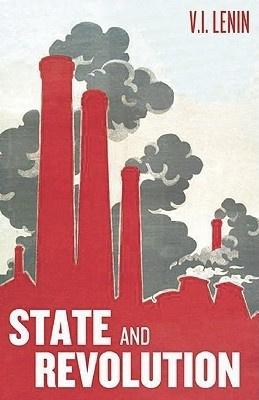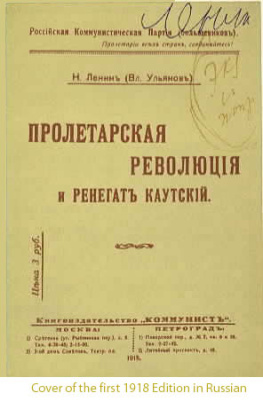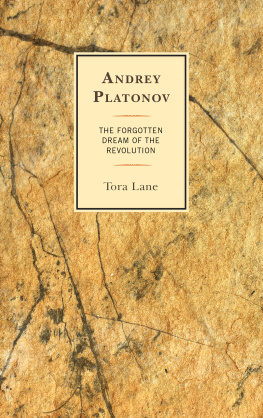Andrey Yanuaryevich Vyshinsky - The Teachings of Lenin and Stalin on Proletarian Revolution and the State
Here you can read online Andrey Yanuaryevich Vyshinsky - The Teachings of Lenin and Stalin on Proletarian Revolution and the State full text of the book (entire story) in english for free. Download pdf and epub, get meaning, cover and reviews about this ebook. City: London, year: 1948, publisher: Soviet News, genre: Politics. Description of the work, (preface) as well as reviews are available. Best literature library LitArk.com created for fans of good reading and offers a wide selection of genres:
Romance novel
Science fiction
Adventure
Detective
Science
History
Home and family
Prose
Art
Politics
Computer
Non-fiction
Religion
Business
Children
Humor
Choose a favorite category and find really read worthwhile books. Enjoy immersion in the world of imagination, feel the emotions of the characters or learn something new for yourself, make an fascinating discovery.

- Book:The Teachings of Lenin and Stalin on Proletarian Revolution and the State
- Author:
- Publisher:Soviet News
- Genre:
- Year:1948
- City:London
- Rating:5 / 5
- Favourites:Add to favourites
- Your mark:
- 100
- 1
- 2
- 3
- 4
- 5
The Teachings of Lenin and Stalin on Proletarian Revolution and the State: summary, description and annotation
We offer to read an annotation, description, summary or preface (depends on what the author of the book "The Teachings of Lenin and Stalin on Proletarian Revolution and the State" wrote himself). If you haven't found the necessary information about the book — write in the comments, we will try to find it.
Andrey Yanuaryevich Vyshinsky: author's other books
Who wrote The Teachings of Lenin and Stalin on Proletarian Revolution and the State? Find out the surname, the name of the author of the book and a list of all author's works by series.
The Teachings of Lenin and Stalin on Proletarian Revolution and the State — read online for free the complete book (whole text) full work
Below is the text of the book, divided by pages. System saving the place of the last page read, allows you to conveniently read the book "The Teachings of Lenin and Stalin on Proletarian Revolution and the State" online for free, without having to search again every time where you left off. Put a bookmark, and you can go to the page where you finished reading at any time.
Font size:
Interval:
Bookmark:
"The first revolution born of the imperialist world war has broken out. This first revolution will certainly not be the last."
That was what Lenin wrote in his famous "Letters from Afar" on the subject of the February-March revolution of 1917 in Russia, his mind of genius penetrating into the future. The February-March revolution was prepared and called forth as the result of an entire range of circumstances of world historical significance. The February-March revolution of 1917 was preceded by the three years of 1905-1907years of the greatest class battles and revolutionary effort of the Russian proletariat. Emphasizing this fact, Lenin pointed out that this, the truly first revolutionthe great revolution of 1905, dismissed by the Guchkovs and Milyukovs and their underlings as a "great rebellion"led twelve years later to the revolution of 1917, on which the same Octobrist and Cadet politicians lavished their praise and enthusiasm, because they saw in the overthrow of the Tsarist autocracy and the transfer of power into their own hands the crowning of all their efforts and the realisation of their political designs.
In his "Letter from Afar" Lenin with characteristic genius demonstrated that the February-March revolution which had given power to the bourgeoisie could not come to a halt and, so to speak, be rounded off by such a result. The first imperialist war, which in Lenin's apposite expression was an all-powerful "stage manager", the mighty accelerator of the course of world history, was bound to speed up greatly and, as Lenin wrote, "unusually sharpen the class struggle of the proletariat against the bourgeoisie and transform itself into a civil war between hostile classes".1
1 Lenin. Collected Works (English edition), XX, part 1, p. 29.
Three main political forces were then functioning on the arena of history in which the dramatic events of the February-March Revolution were unfolding. The first force was the Tsarist monarchy, the head of the feudal landowners, of the old bureaucracy and higher military command. The second force was "Russia of the bourgeoisie and landowners represented by the Octobrists and Cadets, with the petty bourgeoisie dragging at their tail". The third force was "the Soviet of Workers' and Soldiers' Deputies, seeking as allies the whole proletariat and the whole mass of the poorest population".2
2Ibid.
The February-March revolution came to victory so quickly because there existed, as Lenin wrote, "an extremely original historical situation", when there came together and came together in a remarkably "whole-hearted" manner, "absolutely dissimilar currents, absolutely heterogeneous class interests, absolutely opposed political and social aspirations".
Lenin wrote of this precisely and clearly. He said: "There was the conspiracy of the Anglo-French imperialists, who urged Milyukov, Guchkov and Co. to seize power with the object of prolonging the imperialist war, with the object of conducting it still more savagely and stubbornly, with the object of slaughtering new millions of Russian workers and peasants so that Constantinople might be obtained... by the Guchkovs, Syria... by French capitalists, Mesopotamia... by English capitalists, etc. This on the one side. And on the other, there was a profound proletarian and popular mass movement (all the poorest population of the towns and villages) a movement of a revolutionary character, for bread, for peace, for real liberty.
"The revolutionary workers and soldiers have destroyed the infamous Tsarist monarchy to its very foundations, being neither elated nor worried by the fact that, at certain brief historic moments, exceptional in their combination of circumstances, they are aided by the struggle of Buchanan, Guchkov, Milyukov and Co., who only desire to replace one monarch by another. Thus, and only thus, did it occur."1
1Ibid., p. 31.
The first government which replaced the Tsarist autocracy as a result of the February-March revolution was composed of representatives of the class of capitalist landowners and bourgeoisiea class which had in fact long before 1917 governed Russia and now, in February-March 1917, had taken shape and legalised itself, if one may use a juridical expression, by an act of revolutionary initiative. This government had been pushed to power by the Anglo-French Allies, in order to use Russia to the maximum in the first world war, naturally in their own interests. That was why Lenin gave this government of the Guchkovs and Milyukovs the well-chosen title of a mere clerk of the multi-millionaire "firms", England and France...
Lenin wrote that this was a government of war, a government of continuation of the imperialist slaughter, a government of conquests, tied hand and foot to Anglo-French capital; and that Russian capital was only a branch of the world-wide "firm", with a turnover of hundreds of milliards of roubles, bearing the title: "England and France".
The task of that government was to continue the war until victory, and as before to hold bloody funeral rites over the Russian workers and peasants. But the workers and peasants did not want war; they demanded peace, bread and liberty. This the Provisional Government of the Guchkovs and Milyukovs could not give. It had to be taken by force, by the armed hand of the proletariat in alliance with the working peasant masses who already had their centre of leadership. Such a centre was the Petrograd Soviet of Workers' and Soldiers' Deputies, of which Lenin wrote in April, 1917 that, making its appearance side by side with the official Government, it was a new an unofficial, undeveloped, still comparatively weak workers' government or, more exactly, the embryo of a workers' government, the representative of the interest of all the poorest masses of the population, i.e., nine-tenths of the people who were struggling for peace, bread and liberty.
Lenin ended his first "Letter from Afar" with the remark that "the only guarantee of liberty and of complete destruction of Tsarism is the arming of the proletariat, the strengthening, broadening and developing of the rle, significance and power of the Soviets of Workers' and Soldiers' Deputies".1
1Ibid., p. 33.
He demanded help in the arming of the workers, or that, at any rate, it should not be hindered. In that event, wrote Lenin, "Russia will be invincible, the monarchy incapable of being restored, the Republic secure". In this letter Lenin demonstrated the peculiarity of the momentone of transition from the first to the second stage of the revolution, in which the watchword should be: "Workers, you have displayed miracles of proletarian and popular heroism in the civil war against Tsarism; you must display miracles of proletarian and nation-wide organisation in order to prepare your victory in the second stage of the revolution".2
2Ibid., p. 34.
In his article on "The Tasks of the Proletariat in the Present Revolution", published in Pravda (No. 26, April 20, 1917) Lenin set forth his famous ten theses, in which he pointed to this transition , to the second stage of the revolutiona stage "which must place power in the hands of the proletariat and the poorest strata of the peasantry". In these theses Lenin insisted on the necessity of explaining to the people that the Soviet of Workers' Deputies was the only possible form of revolutionary government, and that the Bolsheviks, being in a minority in the Soviets, were carrying on in these conditions the work of criticizing and exposing errors, "at the same time advocating the necessity of transferring the entire power of State to the Soviets of Workers' Deputies, so that the masses may by experience overcome their mistakes", i.e., of confidence in pseudo-Socialists and in the Menshevik-Cadet-S.R. Government, of a policy of compromise with the bourgeoisie and of a policy of support for a government of capitalists, those "worst enemies of peace and Socialism".
Font size:
Interval:
Bookmark:
Similar books «The Teachings of Lenin and Stalin on Proletarian Revolution and the State»
Look at similar books to The Teachings of Lenin and Stalin on Proletarian Revolution and the State. We have selected literature similar in name and meaning in the hope of providing readers with more options to find new, interesting, not yet read works.
Discussion, reviews of the book The Teachings of Lenin and Stalin on Proletarian Revolution and the State and just readers' own opinions. Leave your comments, write what you think about the work, its meaning or the main characters. Specify what exactly you liked and what you didn't like, and why you think so.





